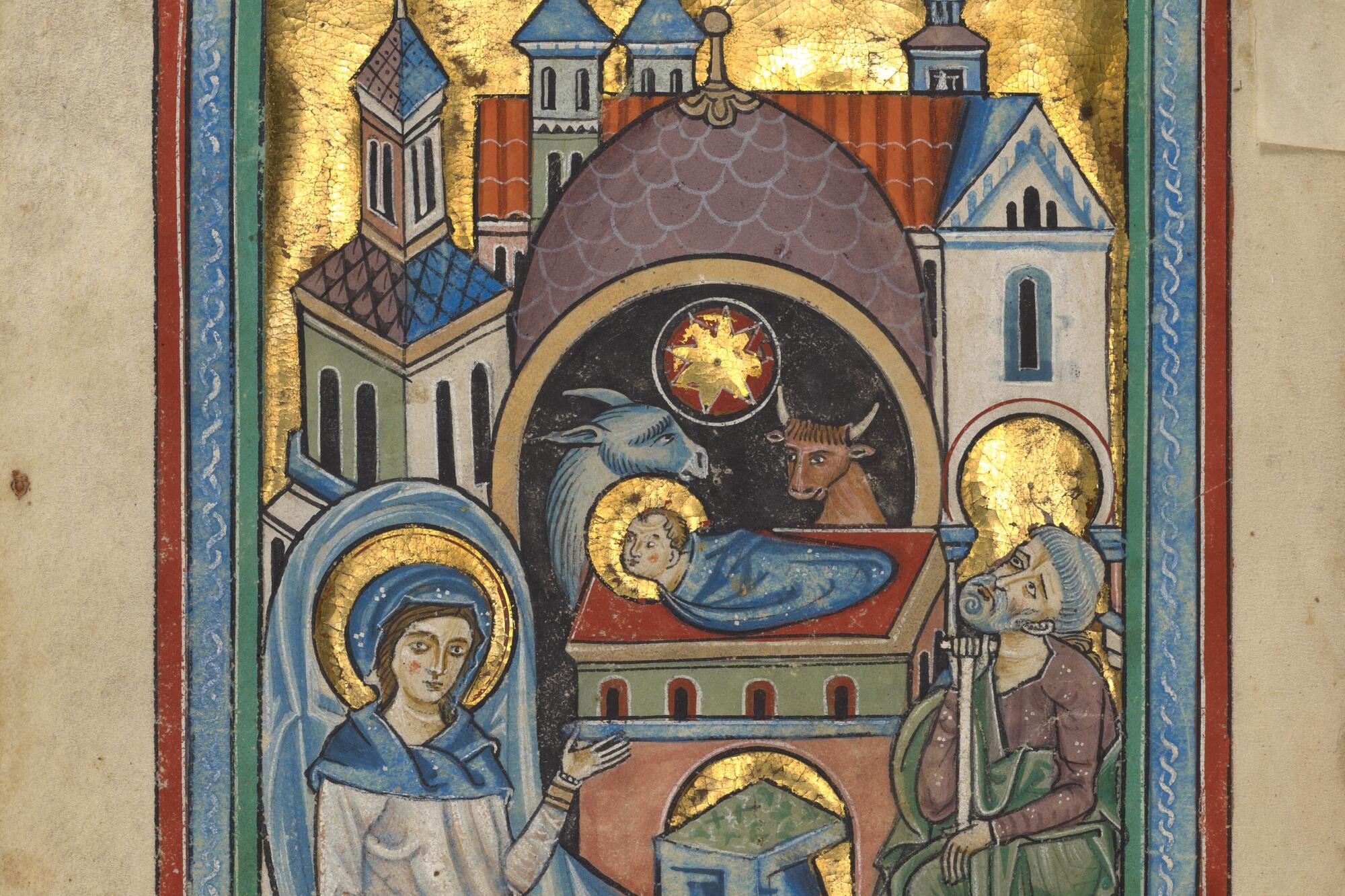
- Share via
Christmas in the United States is a holiday chiefly for children. It is a season of candy canes and presents, “A Christmas Story” and the Grinch, mall Santas and the exhausted mothers whose valor they steal.
At church we organize children’s pageants and choirs. At home, we hang Advent calendars stuffed with cheap chocolate. Before we had kids, my husband and I never put up more than a Whole Foods mini-tree; now we have a nine-footer so hefty it had to be ratchet-strapped to the banister. “Tiny tots with their eyes all aglow/ Will find it hard to sleep tonight.”
Christmas is for kids, of course. But our culture’s Christmastime focus on children comes with a grave risk: It teaches us that Christmas is small and soft and sweet. It says this is a holiday about a cute baby nuzzled by fuzzy lambs amid fresh hay in a cozy stable that looks suspiciously like 19th-century England.
It lulls us into forgetting that Christmas, fundamentally, is a celebration of God looking at a broken and self-betrayed world and refusing to abandon us to death and desolation. For Christians, Christmas is a holiday about ending the horrors of war, illness, isolation and the infinite ways we are cruel to one another. It is about God sneaking into captured territory via emergency childbirth in a dirty stable to bait evil itself and lure it to its full and final end.
This more bracing story of Christmas should not be unfamiliar to us — it’s right there in the carols.
God rest ye merry, gentlemen,
let nothing you dismay,
remember Christ our savior
was born on Christmas day
to save us all from Satan’s power
when we were gone astray.
Dismiss the chintzy Victoriana it tends to invoke; this is an account of the rescue of humanity from evil personified.
Or what about “Hark! The Herald Angels Sing”? They’re singing because God himself has come to bring peace. And he must, for we clearly can’t do it. We bomb children. We starve cities. We lie and steal, insult and estrange. No newspaper reader can seriously doubt the basic Christian contention that something has gone wrong with us as a species, and no one can honestly deny that evil — and, eventually, death — is in each one of us too. All that is true, but “mild he lays his glory by,/ born that man no more may die.”
My favorite carol is “O Holy Night,” an old French hymn that’s notoriously difficult to sing. But the difficulty is worth it, for the song tells of a weary world pining for justice, of people beset by trials and weakness. The third verse, penned in 1843, before the end of the transatlantic slave trade, stands in starkest contrast to the silly reduction we often make of Christmas today:
Truly he taught us to love one another;
His law is love and his Gospel is peace.
Chains shall he break, for the slave is our brother,
And in his name all oppression shall cease.
I know, I know the objections. Jesus was born some two millennia ago, and there’s still plenty of oppression to go around. We still die. We still bomb children. Perhaps, in a roundabout way, the notion that God is trouncing evil is the most childish Christmas story of them all.
Perhaps. But let me point to one more carol, this one written by no less than Henry Wadsworth Longfellow:
I heard the bells on Christmas day
Their old familiar carols play,
And wild and sweet the words repeat
Of peace of earth, good will to men.
Sure, sounds great, but Longfellow’s caroler is a realist. It’s 1863, and he can see what the world is like.
And in despair I bowed my head:
“There is no peace on earth,” I said,
“For hate is strong, and mocks the song
Of peace on earth, good will to men.”
Who could beg to differ? It’s obvious, irrefutable, inescapable. Yet it’s also not the end of the song. The bells come back, “more loud and deep” :
“God is not dead, nor doth he sleep;
The wrong shall fail, the right prevail,
With peace on earth, good will to men.”
I can’t prove that claim any more than Longfellow could, writing soon after his wife died in a fire and his son was severely injured in the still raging Civil War. I can only tell you that this is what we celebrate and anticipate at Christmas.
Children can understand the celebration and the anticipation, but only to a point. The sheer longing for relief these carols express is something I suspect most of us acquire only with age and exposure to the extent and constancy of evil.
In this sense, the hope that Christmas represents cannot be childish because it cannot be naïve or ignorant of life and its fragility. This hope is a longing necessarily informed about the scarcity of peace. It is a yearning well-read on our shortages of good will. It is the recognition of just how much has gone wrong — paired with a dogged insistence that this vulnerable God-child came to make it all right.
Bonnie Kristian is the editorial director of ideas and books at Christianity Today. She is the author of “Untrustworthy” and a fellow at Defense Priorities.
A cure for the common opinion
Get thought-provoking perspectives with our weekly newsletter.
You may occasionally receive promotional content from the Los Angeles Times.







